
Official Edgar Rice Burroughs Tribute and Weekly Webzine Site
Since 1996 ~ Over 15,000 Webpages in Archive
Volume 6780
DON "TARZAN" BRAGG REMEMBERED
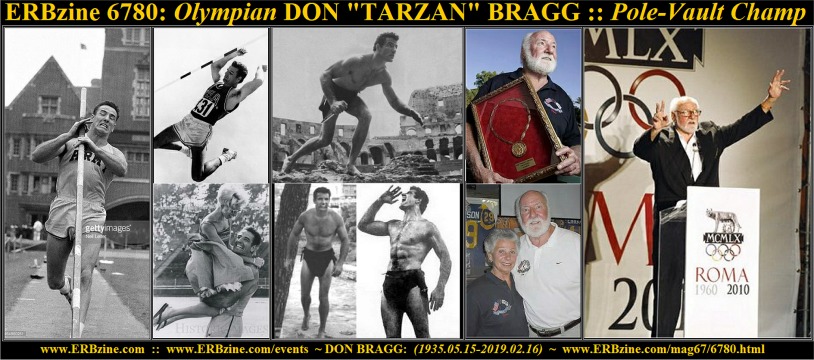
Click for full size


Don Bragg's Gold Medal victory in the 1960 Olympics brought him to the attention of Sy Weintraub, producer of Tarzan films, who called him for a screen test after Gordon Scott quit the role. Tragically, Don had cut his foot and it required several months of healing and Weintraub couldn't wait. The role for the next two Tarzan films went to Jock Mahoney instead.Nicknamed Tarzan because of his size and strength, Bragg's goal was to play that role in the movies. Few have so actively pursued a role. He toured Europe and Africa for the U.S. State Department as a goodwill ambassador, climbing trees and swinging from vines. He met Johnny Weissmüller, who agreed that Bragg would be perfect as Tarzan. When he won the gold at the 1960 Olympics he did the infamous Tarzan yell from the podium, shocking the crowd.
In August 2010, Bragg made a speech in Rome at a ceremony commemorating the fiftieth anniversary of the 1960 Summer Olympics. He concluded this speech with his Tarzan yell.
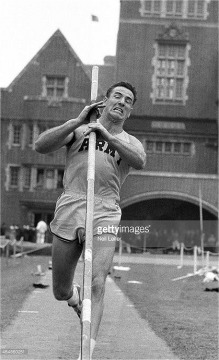
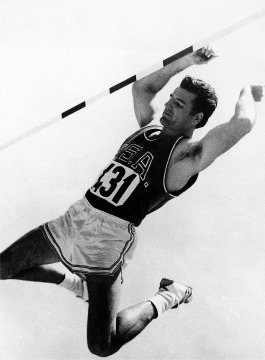
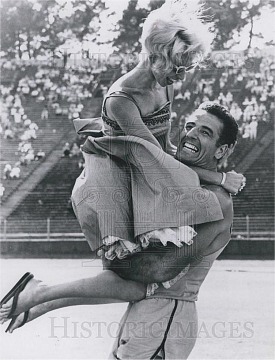
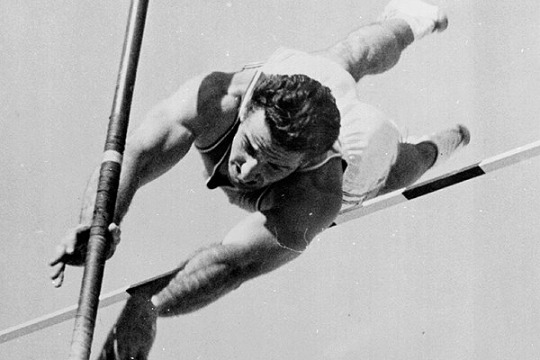
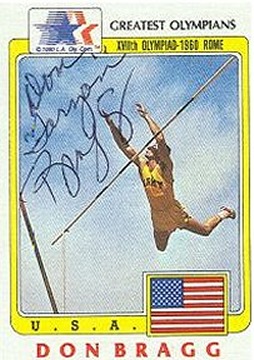
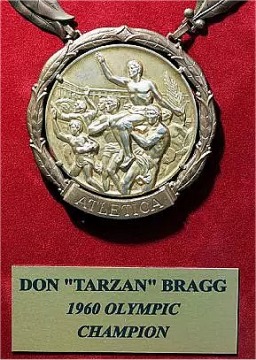
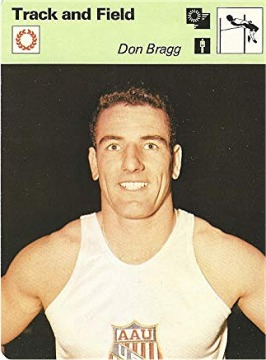
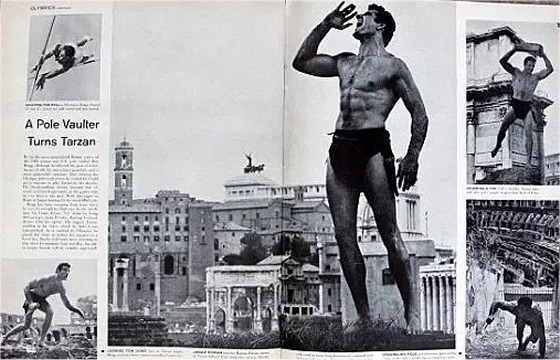
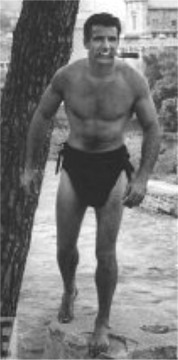
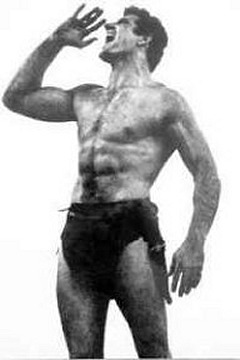
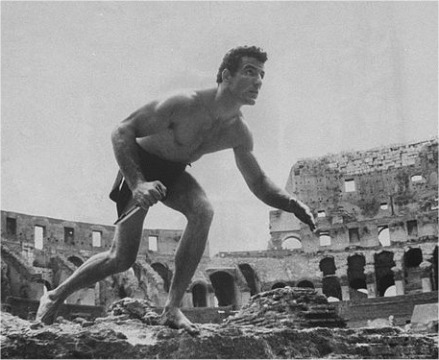
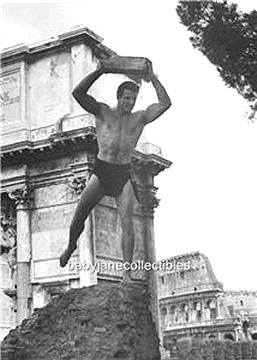
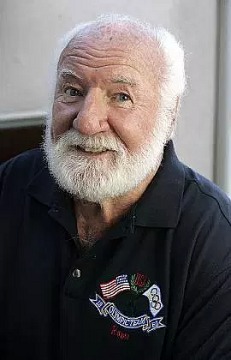
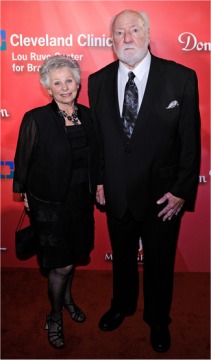
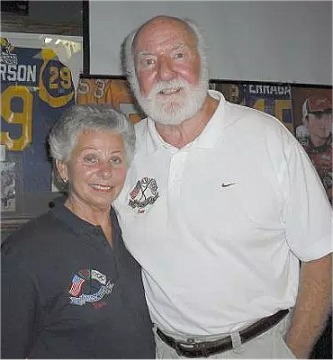
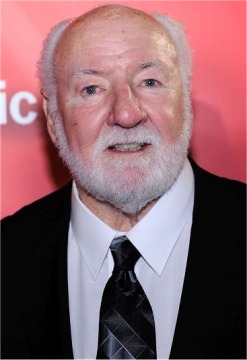
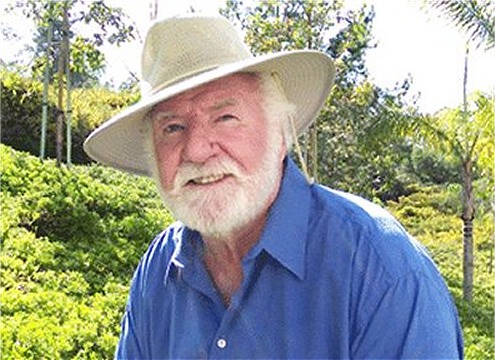
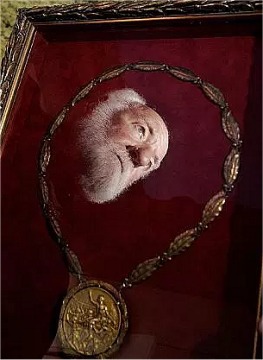
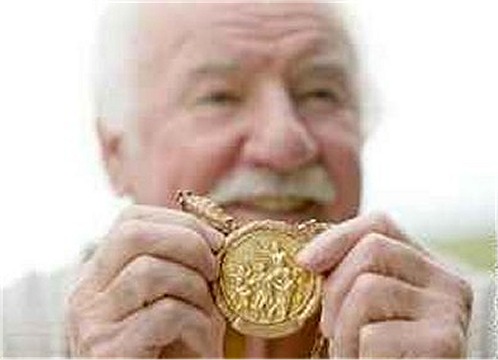
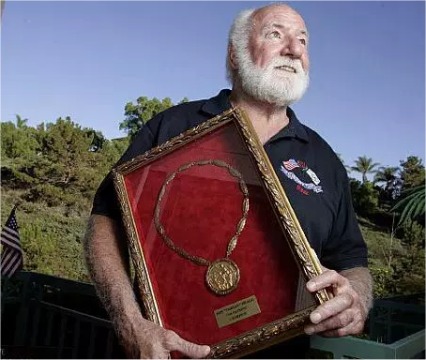
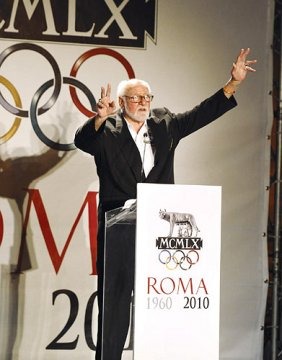
The Olympic winner who didn’t get to be Tarzan
Orange County Register ~ August 20, 2008
Before in ’56 I tried to score, but failed.
And again in ’60 by myself I tried once more …
Only winning gave me royal grace
Forever securing my golden placeA torn right leg muscle kept Don “Tarzan” Bragg from making the 1956 Olympics U.S. pole vault squad. But it didn’t crush the 21-year-old’s Olympic dream, fueled by a carpenter father who built a pole vault pit in the family’s back yard to help his son excel in sports.
A dream that took shape in the outdoors, swinging from tree vines and ropes and using bamboo poles discarded by a rug store in his south New Jersey neighborhood to launch himself over clothes lines, creeks and ditches. A dream one day to be like his hero, Tarzan, the barrel-chested fictional ape man, who loomed large in a kid’s life; strong and king of the jungle.
This dream would carry Bragg four years later to the Olympic podium in Rome, earning him a gold medal for vaulting over 15 feet 5 inches, an Olympic record that still holds because he was one of the last to use a metal pole. (Since the 1960s, pole vaulters have used fiberglass poles, flexible and lighter in weight.)
Bragg charged up with pole in hand in the 95-degree heat, after eight hours of grueling competition that knocked his weight down from a strapping 198 pounds to 187, and went airborne. He feared that his cotton shirt, weighed down by sweat and pins that held up his number against his chest, might tip the cross bar. As he seemed to fly and then, upon landing, he lay on his back, his eyes fixed on the bar, worried that vibration from the roar of the 50,000 people still in the stands at Rome’s Stadio Olimpico might dislodge the beam. For Bragg, the moment froze in time.
••• Across the Atlantic, over the Delaware River, not too far from his hometown of Penns Grove, N.J., in the two 11-story DuPont Nemours buildings, the PA system crackled with the voice of a commentator. Blood drained out of a young Theresa Fiore’s body. Only months earlier the blonde beauty had dashed onto the field and into the arms of Bragg after he made the pole vault team at the U.S. Olympic trails in Palo Alto. The image of the couple, together, became an instant icon, landing on the front pages of newspapers around the country.On that Olympic victory day, his hometown sweetheart was on the telephone with a reporter in New York. The newsman patched Fiore through to a fellow reporter in Rome, who was witnessing Bragg’s vault. Fiore’s bosses at DuPont, where she worked as a secretary, allowed the call to be heard throughout the office.
“He’s up, he’s over… He’s just won the gold medal.” The Delaware office, like the crowd in Rome, erupted in jubilation.
Fiore dropped the telephone and wept. She and Bragg had had a long courtship and she remembered him saying that the gold would go on her finger after the Olympic gold went around his neck. “I figured if he didn’t make it, this might be over and done with,” she said of the relationship, laughing.
Back in Rome, Bragg wasn’t finished. “The vault is not done until you walk out of the pit,” he says.
That muggy summer night, Bragg walked out of the pit and into Olympic history, followed soon after with more than 45 years of matrimony. But Bragg’s journey was just starting, and not every step would be as graceful. His post-Olympic life has been a testament to the fact that life doesn’t necessarily get easier after you join the pantheon of Olympic champions. No one cheers from the sidelines in most of life’s battles, usually fought alone.
New challenges, perhaps even greater than ones he faced in the sporting arena, still awaited the champ and turned him inward. He would eventually find catharsis and set his emotions free in many poems he penned in the late 1970s. Through the poetry emerges a portrait of a man at times roiled by pain and even in fear of the end of life. Yet Bragg’s words speak of challenging oneself to succeed, of climbing the next peak.
Bragg, as a recent Olympian, was set to play the lead in the next Tarzan movie, following Johnny Weismuller, also an Olympic gold medalist. But the project was stalled by litigation. When Hollywood called again, a few years later, Bragg had 18 stitches on his foot because of a fall while vaulting. I had a son who did not run
He never played a game …
I had a son who shortly died
He never had a name.
•••Then a state employee, Bragg turned his attention to “Kamp Olympik,” also the title of a new book he has just published. The camp was Bragg’s effort to help inner-city kids have the outdoor experiences that he’d loved as a boy. A 400-acre property in pristine New Jersey pinelands opened in July 1967. Kamp Olympik was next to a river, with plenty of trees from which to swing, just like Tarzan. The camp ended after an 11-year run and some 5,000 children having gone through its programs. The Braggs were at one of their lowest points in life, depleted and having lost their fifth child just hours after birth.
About the same time, Bragg lost his job as the athletics director at Stockton State College in New Jersey, a program he helped build. Lost too were properties he had bought as investments because they became part of environmental preservation areas due to changes in laws. Everything in his life seemed to be collapsing.
Bragg turned to poetry.
We shudder when it does appear
The feeling of combat we know is near.
Yet if we could tally all
We have risen more than we did fall.Over time, the Olympic couple got back on their feet. Today, Bragg talks excitedly about his latest book and hopes of turning it into a movie script. As during previous Olympics, the Beijing games have revived old memories, helping Bragg relive his triumphant pole vault. The old Tarzan in him still lives. “You know what, we could do a movie called ‘Son of Tarzan’ and I could play his father,” Bragg says. It’s a dream, he says. He laughs hard.
The man in a still gladiator-like body has gone through six heart bypass surgeries, an operation on his spine from all the banging he took from falls on his back. Welts and lumps on his legs are still visible.
He gets motivated – like Beijing gold medalist Michael Phelps was recently by the words of the French swim team that said it would crush the Americans – when someone tells him something can’t be done. The Russians made the same error back in 1960, saying that Bragg would be next to fall to them after U.S. high jumper John Thomas. That’s all the push Bragg needed to achieve Olympic glory.
Don Bragg, Olympic Pole-Vault Champion, Is Dead at 83
Carmon Report ~ February 16, 2019Don Bragg, who was denied his dream of playing Tarzan in the movies but parlayed his imposing physique into a gold medal in the pole vault at the 1960 Rome Olympics, died on Saturday at his home in Oakley, Calif., near San Francisco. He was 83. His wife, Theresa Bragg, confirmed the death. She said he had been in failing health since having a stroke 10 years ago.
Competing in the era of relatively rigid aluminum poles, which required superior upper-body strength, the muscular Bragg, a 6-foot-3 200-pounder, dominated the pole vault in the late 1950s. Already the holder of world indoor and outdoor records, Bragg vaulted 15 feet 5? inches at the Rome Games — exceeding by almost six inches the Olympic record set by Bob Richards in 1956 — despite having injured a leg muscle a few weeks earlier. Bragg dueled for six and a half hours with his teammate Ron Morris, who won the silver medal, and then climbed the victory stand and let out a Tarzan yell.
Born and raised in New Jersey, Bragg had idolized the ape man famously played for many years in the movies by another Olympian, the swimmer Johnny Weissmuller. “I went to a lot of Tarzan movies, and I was always trying to emulate him,” Bragg was quoted as saying in “Tales of Gold: An Oral History of the Summer Olympic Games Told by America’s Gold Medal Winners” (1987), by Lewis H. Carlson and John J. Fogarty. “I was always going to the woods, where I had a hideaway called Tarzanville. I’d be out there, swinging through the trees and trying to vault over poles that I’d place between the branches.”
Bragg used bamboo rods he got at a furniture store, where they had been used to wrap carpeting. While attending a track meet in Philadelphia when he was a sophomore at Penns Grove High School in New Jersey, he met Richards, who encouraged him to pursue the sport on a more formal basis.
Bragg was recruited for Villanova University by its renowned coach, Jumbo Elliott. In Bragg’s senior season, during the winter of 1957, he joined with the runners Ron Delany, Charlie Jenkins and Ed Collymore on one of collegiate track and field’s greatest squads. Elliott occasionally entered Bragg in sprint events to refine his approach to the pole-vault bar. “He didn’t know that much about pole-vaulting, but he did improve my speed,” Bragg said in “Tales of Gold.” Bragg won the National Collegiate Athletic Association’s outdoor championship in 1955 and was the IC4A pole-vault champion, both indoor and outdoor, from 1955 to 1957.
Soon after Bragg retired, flexible fiberglass poles were introduced, rewarding superior technique as well as strength and speed. Those poles, which can bend 90 degrees, act like slingshots, catapulting vaulters to heights far beyond those possible with the poles used by Cornelius Warmerdam, the first vaulter to clear 15 feet, and Bragg. “If pro track had come along after 1960, I never would have retired,” Bragg once said. “But I couldn’t see learning how to vault all over again with the new poles just to win another medal.”
He broke the world indoor record, set 16 years earlier by Warmerdam, when he vaulted 15 feet 9½ inches on Feb. 13, 1959, at Convention Hall in Philadelphia. That vault eclipsed Warmerdam’s mark by a full inch. He set a world outdoor record by vaulting 15 feet 9¼ inches at the Olympic trials at Stanford Stadium in July 1960.
Bragg carried his poles in canvas cases marked “Don (Tarzan) Bragg,” a flourish that evoked ribbing. “The Californians would always try to psych me out at their home meets,” he remembered. “They’d put a comic-book cover on my locker bearing a likeness of Tarzan and a chimpanzee, and the chimp would be saying, ‘Me Bragg, you Tarzan.’” He had several chances to play Tarzan in the movies after he retired from the pole vault, but twice lost roles because of injuries and once saw a prospective film fall victim to a copyright-infringement dispute.
Donald George Bragg was born on May 15, 1935, in Penns Grove, N.J., one of four children of George Bragg, who did construction work for DuPont, and Jean (McCoy) Bragg, a homemaker. Bragg and his wife operated a summer camp for boys in Chatsworth, N.J., in the 1960s and ’70s that concentrated on remedial reading and mathematics. He was the athletic director at Richard Stockton College of New Jersey (now Stockton University) in Pomona in the ’70s and ’80s and invested in real estate. But then came hard times.
After the New Jersey Legislature in 1979 passed the Pinelands Protection Act, which banned development on 1,000 wilderness acres Bragg had purchased, he went bankrupt. He later opened a kayak operation in the Pinelands area.
In addition to his wife, the former Theresa Fiore, Bragg is survived by their sons, Mark and Jeff; their daughters, Tracey Bragg and Renee Bragg; 11 grandchildren; and six great-grandchildren.
Bragg was inducted into the National Track and Field Hall of Fame in 1996, but by then the fiberglass poles had long since made the 15-foot mark — cleared by Bragg 25 times at Villanova — as much a relic as baseball’s dead ball. As he once put it: “It’s a different event now. The pole does all the work.”
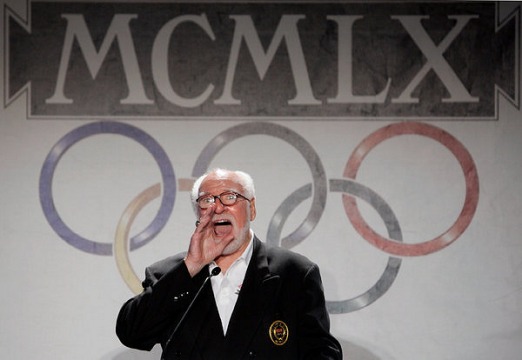
![]()
REFERENCES
Don Bragg Remembered in ERBzine
www.ERBzine.com/mag67/6780.html
Don Bragg references at ERBzine:
www.erbzine.com/mag21/2101.html
www.erbzine.com/mag5/0534.html
ERB Life and Legacy Daily Events
www.ERBzine.com/mag63/6317.html#FEBRUARY16
Don
Bragg in Wikipedia
Don
Bragg is Dead at 83: NY Times
Olympic
Winner Who Didn't Get To Be Tarzan: OCR Register
Don
Bragg's Autobiography in Amazon
![]()
![]()

![]()
BILL
HILLMAN
Visit
our thousands of other sites at:
BILL
AND SUE-ON HILLMAN ECLECTIC STUDIO
ERB
Text, ERB Images and Tarzan® are ©Edgar Rice Burroughs, Inc.-
All Rights Reserved.
All
Original Work ©1996-2019 by Bill Hillman and/or Contributing Authors/Owners
No
part of this web site may be reproduced without permission from the respective
owners.